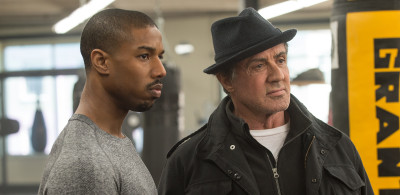
“Creed” not only refers to the film’s main character Adonis Johnson (Michael B. Jordan), but also implies the legacy that the name carries. Adonis, or Donnie, is the son of Apollo Creed, the famously undefeated boxer from the original “Rocky” film. It is this prevailing theme of legacy and namesake that elevates “Creed” past the conventions of a standard boxing drama and into the realm of being a serious Oscar contender.
This theme of legacy is actually two-sided. “Creed” is the seventh film in the “Rocky” franchise yet it manages to set itself apart from past entries and blaze its own trail. Similar to how Donnie is determined to make a name for himself without the use of his father’s name, the film starts off unlike any “Rocky” film before — a very intentional move.
The narrative begins with Donnie preparing for an underground boxing match in Tijuana. The darker and grittier struggle of the character is instantly palpable, only to be followed up by an excellently filmed boxing match.
Director Ryan Coogler, best known for “Fruitvale Station”, filmed these matches on a technical level of excellence rivaled only by the likes of last year’s “Birdman.” There are few, if any, cuts during the matches, allowing the camera to circle around the ring naturally, like an omnipresent spectator.
The tight framing of fights creates a sense of tension and danger that refuses to let go of the audience’s attention. This level of technical prowess is present in every match, especially during the film’s final climactic showdown.
While legacy is the predominant theme of the film, it is the underlying themes of acceptance and courage that make it so powerful in the first place. Donnie struggles throughout the film on whether or not to embrace his father’s name.
Is he willing to pick up the legacy and be held up to the standards of his father? Or will he choose to reject, and even resent, his origins? In a similar vein, Rocky Balboa himself (Sylvester Stallone) must decide on whether or not to reenter the world of boxing in order to train the son of one of his greatest opponents.
The choices these characters make and growth they undergo, along with their determination to keep on fighting no matter what, are classic motifs of the franchise. These choices underscore the characters’ courage to fight, as well as the filmmaker’s courage to make “Creed” about more than just about boxing.
The relationships in Donnie’s life inject pathos beautifully into the narrative. He is taken in by Apollo Creed’s wife, Mary Anne Creed (Phylicia Rashad), despite the fact that he was the product of an affair. She holds no resentment, however, and raises Donnie as if he were her own, even trying to turn him away from a life of fighting.
After the loss of her husband in the ring, Mary Anne distrusts the world of fighting. But it is her love for Donnie that ultimately makes her realize that this is who he is, and all she can do is support him.
Donnie’s relationship with his neighbor and eventual girlfriend Bianca (Tessa Thompson) is also beautifully executed. Normally, forced love interests in films detract from the story. But here, Coogler manages to make Bianca and Donnie mirrors of each other. She is an aspiring singer, trying to make it in the world of music despite her progressive hearing loss. They push each other to succeed, overcoming any obstacles that hinder them.
Donnie’s struggle with identity is what drives his character growth and eventually makes him realize who he is. It is because he has the strength to struggle, to refuse to use his father’s name as a crutch, that he is worthy of the name Creed.
Even though critics taunt him as being a “Baby Creed” and even though he is haunted by the sins of his father, Donnie rises above it all and proves his worth.
Therein lies the classic theme of the “Rocky” franchise: “Nobody is gonna hit as hard as life. But it ain’t about how hard you hit. It’s about how hard you can get hit and keep moving forward.”
Coogler has perfectly brought the spirit of “Rocky” to the modern age. As a spirit that goes beyond boxing or sports, it pierces all facets of life. That is why “Rocky” is universally beloved, and that is why “Creed” deserves to be as well.























































































































